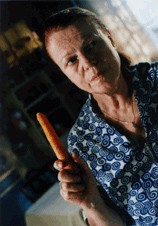 | Ene bene :
Sticking out from the crowd |
A Little Bit of Money and a Lot of Love
Alice Nellis's
Ene Bene
Mark Preskett
Chosen to open the Febio FilmFest and showcased in for the Seven Days of European Film Festival, both of which were held in Prague recently, Alice Nellis's Ene bene (Eeny Meeny, 2000) cannot be said to be an "unsung hero." It was awarded a Český Lev (Czech Lion) for Best Supporting Actress, and has been feted in film festivals as far afield as San Francisco, Russia and Italy.
Despite the awards, little is known about the film outside the Czech Republic and at home Ene bene has been swept under the carpet a little by other new Czech films such as Musíme si pomáhat (Divided We Fall, 2000) and Pelíšky (Cosy Dens, 1999). Yet, the film is one of the few successful films that have attempted to comment on contemporary society and goes against the tried and tested, and more popular, features which focus on the past or fairy-tales.
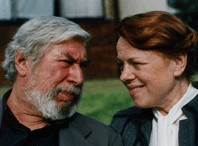 | | Suchařípa and Janžurová | Set in a small Bohemian town in the middle of local election "fever," the film centres on two retired school teachers, trying to cope with the recent stroke of the husband, Jan, played by Leoš Suchařípa, a veteran of the Czech film scene and most famous for his role in Věra Chytilová's film Faunovo velmi pozdní odpoledne ( Very Late Afternoon of a Faun, 1983). Taking caring of Jan is the much-suffering Helena, played by Iva Janžurová—another highly respected actress—who silently puts up with his childish petulance. The return of their clearly troubled daughter from her studies in Prague, Jana, further strains the already fragile family.
Jana, played by Theodora Remundová (in fact the real-life daughter of Iva Janžurová) has been persuaded by her mother to return home to sit on the local election committee. She watches
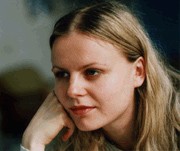 | | Puppy love from Remundová | the amateur efforts of the committee, overseen by the enthusiastic Jarmila (played by Eva Holubová, who won a Český Lev for her role) with barely disguised disdain and remains impervious to the attentions of Jarmila, a close family friend, and Kittnar, a lonely young businessman, who also sits on the committee.
A film about people
Although much of the film is set in the hall where the voting takes place, of the two themes, it is the story of the family and the generation gap that has emerged since the revolution that Alice Nellis most wanted to tell. As the director told CER:
I wanted to make a film most of all about people, in particular, the generation of my parents who lived all their lives under a different regime ... about their personal problems, but because their personal problems are so connected with the situation around them, that's why the film is also about politics.
Helena has been active in the pre-election build up, putting up posters and touring the town campaigning for her favourite. At the same time, Jan, who rarely moves from his makeshift bed set up in the lounge, watches on, openly critical of Helena's enthusiasm and the election in general. His apathy towards politics is shared by many Czechs:
Immediately after the revolution, the people were full of optimism and hope, and had an almost utopian attitude to democracy. Soon, though, they realised that the new system isn't perfect and that the politicians are human and make mistakes. The film is set a few years after the revolution, when many had already lost faith in the electoral process.
Over the course of the next two days, whether or not to go to the polls and who Jan chooses as his candidate becomes an issue that opens conflicts that have been festering since Jan's stroke. At the same time, voting at the election hall becomes more and more chaotic with the addition of gin to their orange juices, and the source of Jana's pain is revealed to the audience.
The Lithuanian connection
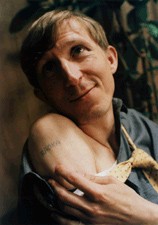 | | Making a mark | Alice Nellis's film is quite an achievement. The story is compelling and well-told and the acting first-rate. It says a lot for the quality of the script, which won at the FAMU Festival (held by the famed Prague film school of the same name) in 1997, as well as faith in Nellis, that actors and actresses of this calibre put themselves in the hands of a first-time director with no feature film experience.
The film is full of stunning visuals shot by Lithuanian photographer, Ramunas Greičius. Simple shots, such as Jana wheeling her push bike along a path and internals of the voting hall, are transformed into things of beauty. It is something that Nellis, with her cameraman, especially focused on:
We paid special attention to the smaller things, and were very careful with movement. We tried to film more static, simple pictures at the start, and thus give us more freedom for movement in the moments of passion. I spent three months with Ramanus, trying to develop a language for the film, and we painted each individual scene ourselves on paper, paying attention to colours and asking ourselves, how and why each shot should be filmed.
If there can be a criticism of the film, it is that it lacks something of an edge. The conflict between Jan and Helena is treated with humour and intimacy and you leave each scene, except the climatic scene, with a smile rather than despair at their inability to communicate. Similarly, the disasters that occur during the final day of voting can be blamed simply on drunkenness, rather than other more sinister forces.
Probably most remarkable is the fact that the film was even made at all. The total budget for the film was CZK 13 million (USD 300,000); cheap even by Czech standards. Was it enough?
No, says Nellis, but "first we tried to get the money, what came next was love."
There was enough love for most of the crew, actors and actresses to devote themselves to the film at a fraction of what they normally demand. Nellis tries to make this up by being loyal to the people she worked with in Ene bene. She recently shot a "making of" documentary for the most expensive Czech film ever made, Jan Svěrák's new film Tmavomodrý svět (Dark Blue World), and used much of the same crew.
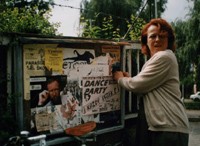 | | Helena on the campaign trail | Initial credit for Ene bene should be given to Česka televize, who were the first to back the film. Nellis approached them with the script and ČT said they liked and were prepared to fund it. When Nellis asked to direct it, they agreed. With the CZK 5 million (USD 125,000) from ČT, Nellis secured another CZK 4 million (USD 75,000) from the State Fund for the Development of Czech Cinematography (SFDCC), the rest came from a private backer and her distributor.
Working for the box
ČT money, though, did not come without a price:
ČT do a very good job, and without them many films would never get made at all. They take a percentage of profits according to how much they invest in the film—but, they also get rights to the film for ever. For me, rights for ten years would be fairer.
According to Nellis, Česka televize, though, are one of only two real places to go for backing and this is why they can demand indefinite rights to any film they back. The other place is the SFDCC, which interestingly is not actually state backed. The money from the fund comes from ticket sales and cinemas and rights from old films. In fact, there is no state support for films in the Czech Republic.
Critics of ČT have stated that the producers, as well as having a virtual monopoly on the Czech film industry, also have quite conservative tastes, especially compared to the ground-breaking films of New Wave era of the 1960s. Nellis, however, disagrees:
In my case, I think they were actually very adventurous. I hadn't studied film, I had no feature directing experience, I'd only made documentaries previously... I just brought in a script. I think that there is a shortage of scripts right now, in fact, I would say that it's the Czech people that aren't very adventurous.
There is a growing trend in recent years for films to focus on the past or
the land of make believe. The film with the highest viewing figures in 2000 was the fairy-tale Princezna ze mlejna II ( Princess from the Mill, 2000), with attendance figures of 480,000—the highest for any film, foreign or Czech. Other than Samotáři ( Loners, 2000) and Cesta z města ( Journey out of the city, 2000), Ene bene was the only "modern" film to break the 60,000 visitor mark.
Gone are the days of the New Wave, now the Age of Commerce rules. The Czech people seem more comfortable with the past or with fantasy, than they are at examining the social situation now, at least when it comes to film. Svěrák's, Tmavomodrý svět, shows that film producers have realised this. Let us hope that young directors, like Nellis, can continue making films that focus on the here and now, be given backing to do so, and not have to rely too much on just love.
Mark Preskett, 11 June 2001
Moving on:
|
|









